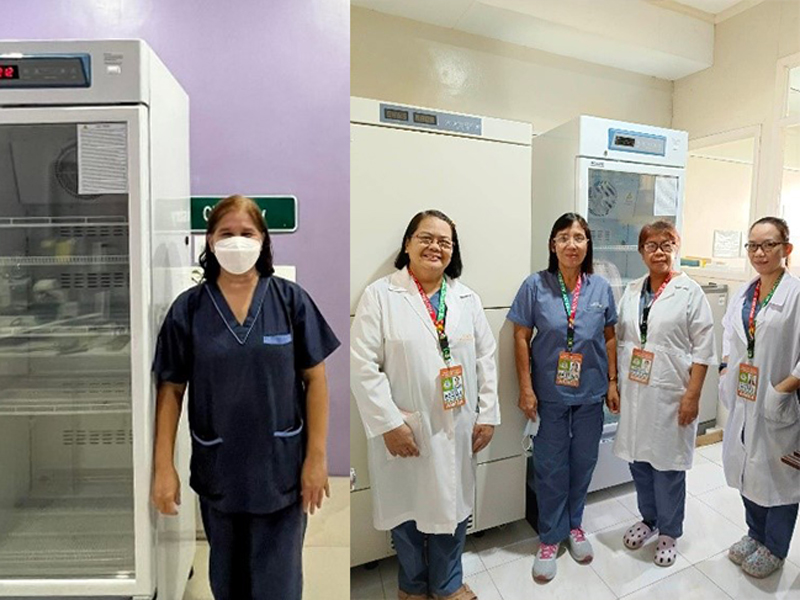Last November, the US President’s Emergency Plan for AIDS Relief (PEPFAR) through the Centers for Disease Control and Prevention (CDC) and ICAP at Columbia University donated laboratory equipment to seven HIV testing facilities in Regions 6 and 7 in the Philippines. The donation was part of the technical assistance to HIV programs in the regions to help enhance, expand, and accelerate testing services and contribute to achieve the UNAIDS “95-95-95” targets for progress toward global HIV epidemic control.

Laboratory staff at Angel X. Salazar Memorial General Hospital inspect the temperature of the new refrigerator and freezer.
The lab equipment is essential for the facilities to be certified by the Department of Health (DOH) as Certified rHIVda Confirmatory Laboratories (CrCL) or commonly referred to as “rHIVda sites.” The rapid HIV diagnostic algorithm, or “rHIVda,” is a national HIV confirmatory process used by the CrCLs wherein three rapid assays (e.g., immunochromatography) are performed in sequential format to confirm HIV serology status of a client. The aim of rHIVda is to significantly reduce turnaround time of HIV confirmatory results to just one day so that positive clients can immediately be linked to treatment and care. The algorithm also cuts the number of clients lost to follow-up between HIV screening and ART initiation. Since rHIVda was launched four years ago, testing facilities now receive HIV confirmatory results within 1-2 days from nearby CrCLs.
Remote facilities, however, still take three to seven days for HIV confirmatory results to be available, which causes delay in ARV enrollment. Under the rHIVda scale-up plan, the DOH suggests developing at least one CrCL per province – prioritizing those with treatment hubs. Currently, there are around 40+ CrCLs across the Philippines. And with this support from the U.S., seven more facilities will be added very soon to the CrCL list.
Deep freezers, reagent refrigerators, centrifuge machines, and micropipettes were given to Angel X. Salazar Memorial General Hospital (Antique), Dr. Rafael S. Tumbokon Memorial Hospital (Aklan), and Roxas Memorial Provincial Hospital (Capiz) in region 6. In region 7, recipients of this lab equipment are Cebu City Social Hygiene Clinic (Cebu City), Cebu South Medical Center (Talisay), Governor Celestino Gallares Medical Center (Bohol), and Negros Oriental Provincial Hospital (Dumaguete).

ICAP Global Health Philippines technical staff and the Negros Oriental Provincial Hospital team headed by Dr. Marie Julien Hitosis during a site visit in Dumaguete.
“Having our own centrifuge, pipettors, refrigerator, and freezer will help us do more work with ease unlike previously when we shared equipment with other sections in the laboratory,” Ms. Net Nieters of Angel Salazar Memorial General Hospital laboratory department said.
The next step for these facilities is to apply to the licensing body of the DOH and secure the License to Operate (LTO) with additional HIV confirmatory function. Once certified, the laboratory facilities can proceed to HIV confirmatory testing and may no longer need to refer initially reactive samples to the National Reference Laboratory – San Lazaro Hospital/STD AIDS Cooperative Central Laboratory (NRL-SLH/SACCL) in Manila or to other regional CrCLs.

The HIV AIDS Core Team of Dr. Rafael S. Tumbokon Memorial Hospital stand beside the -30 degree Celsius freezer at the facility.
“Once we become a rHIVda site, nearby areas in need of HIV confirmatory can easily be accommodated. This will lessen travel time and expenses,” Nietes added.
Mr. Jonnifer Ceniza, medical technologist of Cebu City Health Department, expresses his deep gratitude for the equipment support. “Becoming a CrCL is beneficial for the facility and our clients – and the equipment is truly a big help. Faster processing of our clients’ confirmatory tests means faster enrollment and adherence to ARVs,” Ceniza said.
It took a week to install all the equipment in the two regions by the laboratory supplier – starting with Region 6 first, followed by Region 7. The facilities prepared the required space and electrical requirement of the freezers and refrigerators prior to shipment. In addition, computers and printers will also be provided to the same facilities in support of the laboratory information system. The ICAP in the Philippines technical team will support the facilities in the CrCL certification process during the regular site visits.
About ICAP
A major global health organization that has been improving public health in countries around the world for two decades, ICAP works to transform the health of populations through innovation, science, and global collaboration. Based at Columbia Mailman School of Public Health, ICAP has projects in more than 40 countries, working side-by-side with ministries of health and local governmental, non-governmental, academic, and community partners to confront some of the world’s greatest health challenges. Through evidence-informed programs, meaningful research, tailored technical assistance, effective training and education programs, and rigorous surveillance to measure and evaluate the impact of public health interventions, ICAP aims to realize a global vision of healthy people, empowered communities, and thriving societies. Online at icap.columbia.edu








